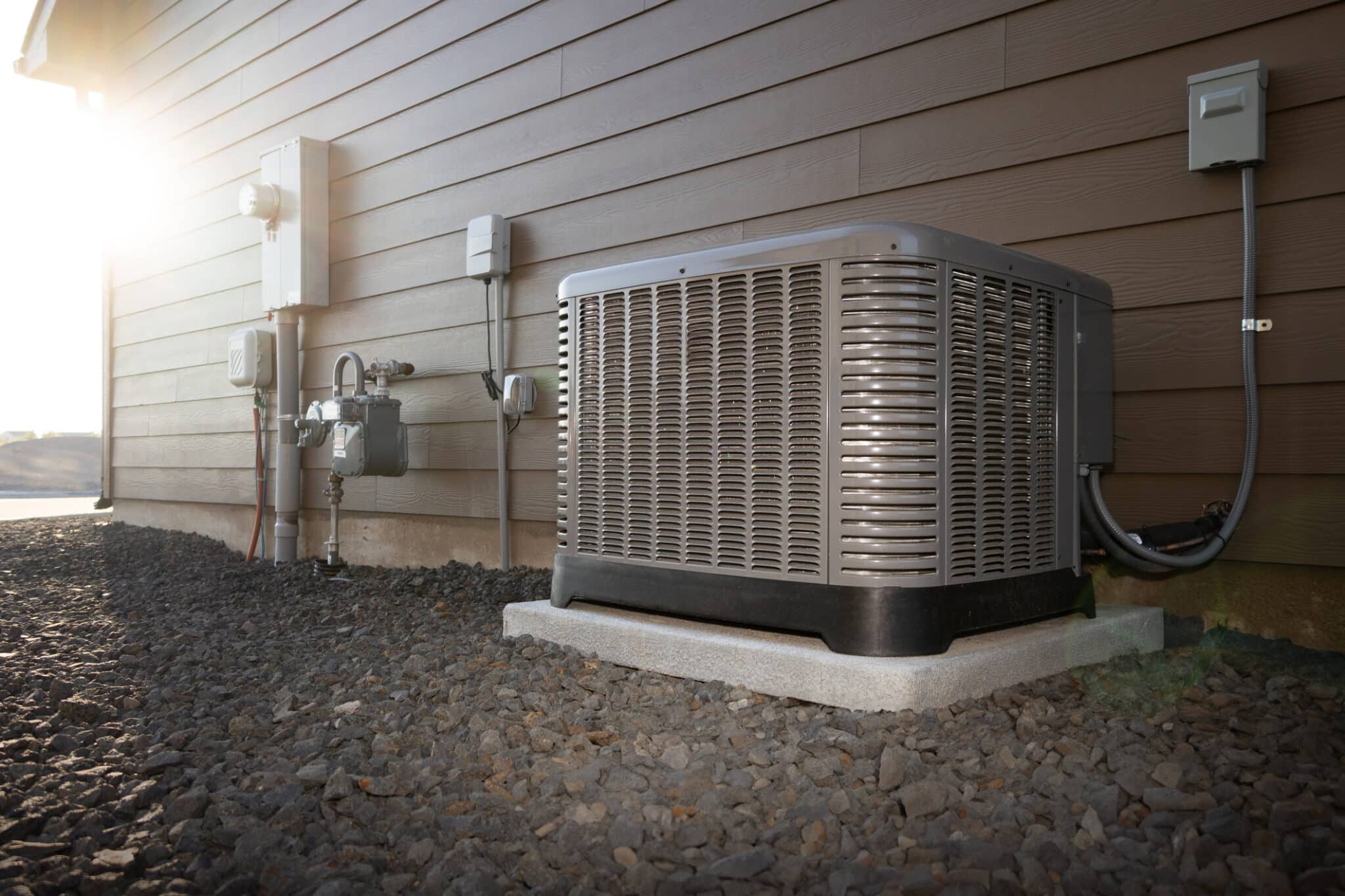Choosing the right HVAC size ensures your home stays comfortable and energy-efficient. Size is measured in BTUs (British Thermal Units), reflecting the system’s heating and cooling power. An oversized unit leads to short cycling and uneven temperatures, while an undersized system runs constantly, increasing wear and energy costs. Factors like home size, insulation, and local climate all impact your choice. Hire a professional to perform an accurate assessment to avoid issues and enjoy optimal comfort and efficiency in your home.

Choosing the right HVAC size for your home can feel overwhelming, but it’s more important than you might think! Have you ever wondered why your home doesn’t stay cool in the summer or why your energy bills are through the roof? It could be because your HVAC system is the wrong size.
The perfect HVAC size keeps your home comfortable and efficient, saving you money in the long run. So, let’s break it down and figure out exactly what you need to know to pick the perfect size for your space.
What is HVAC Size and Why Does it Matter?
HVAC Size Basics
When we talk about HVAC size, we’re referring to the system’s ability to heat or cool your home, not how big the actual unit is. This is measured in BTUs (British Thermal Units), which tell you how much heat the system can remove or add to the air per hour.
A system that’s too small will struggle to maintain the desired temperature, running constantly but never quite catching up. On the other hand, a system that’s too large will heat or cool too quickly, which leads to inefficiency and discomfort.
Impact on Comfort and Efficiency
A properly sized HVAC system ensures that your home stays at a comfortable temperature without overworking itself. If you’ve ever noticed uneven temperatures in different rooms or felt like the air was always a little too humid, it could be due to an improperly sized system.
In areas like Timonium, MD, where summer and winter temperatures vary, this can make a big difference in how comfortable your home feels year-round.
A correctly sized unit also uses less energy, which means lower utility bills and a more environmentally friendly household.
Issues with Incorrect Sizing
Choosing the wrong size HVAC system can lead to a range of frustrating problems. If your system is too small, it will have to run constantly, wearing out quicker and failing to keep up with temperature changes.
On the flip side, if your system is too large, it will short-cycle—meaning it turns on and off too frequently. This can lead to uneven heating or cooling, more frequent repairs, and even shorten the life of your unit, costing you more money over time.
How HVAC Size Affects Your Home
Temperature Control
The right HVAC size ensures your home stays at a steady, comfortable temperature, regardless of how hot or cold it is outside.
If your system is too small, it won’t be able to properly heat or cool your home, leaving you feeling uncomfortable, especially during extreme weather in places like Pikesville, MD. An oversized unit, on the other hand, might cool or heat your home too quickly, resulting in a space that feels drafty or inconsistent in temperature.
The key to temperature control is having a system that works just the right amount to keep things balanced and comfortable.
Humidity Levels
A properly sized system will remove excess moisture from the air as it cools, helping to keep your home at the right humidity level, which is especially important during the humid summers in Timonium.
If your HVAC unit is too big, it will cycle on and off too quickly and won’t run long enough to reduce humidity properly. This can lead to a home that feels muggy and uncomfortable, and in some cases, it can even contribute to mold growth.
Energy Efficiency
One of the biggest benefits of having the right size HVAC system is improved energy efficiency. A system that’s properly sized will run just the right amount to keep your home comfortable, without using extra energy.
If your unit is too small, it will run constantly, wasting energy and driving up your bills. An oversized system wastes energy by short-cycling, leading to more frequent starts and stops, which use up more electricity and increase your monthly costs.
How is HVAC Size Measured?
What is BTU (British Thermal Unit)?
When it comes to measuring HVAC size, BTUs, or British Thermal Units, are the key. A BTU measures how much heat an HVAC system can add or remove from your home in an hour. Essentially, the higher the BTU number, the more powerful the system.
For example, a small home might need a system with around 30,000 BTUs, while larger homes may require units with 60,000 BTUs or more. Understanding BTUs is the first step in figuring out what HVAC size you need for your home.
How BTUs Relate to HVAC Size
The relationship between BTUs and HVAC size is simple: the larger your home or the more heating/cooling power you need, the more BTUs your system should have. However, bigger isn’t always better.
A system with too many BTUs will short-cycle, while one with too few will run constantly. It’s all about finding the sweet spot for your home’s specific needs.
Factors like home size, insulation, and local climate (like the cold winters in Cockeysville) all play a role in determining how many BTUs your HVAC system should have.
Factors That Influence HVAC Size
Home Size and Layout
Your home’s size and layout are one of the most important factors when determining HVAC size. A larger home requires more BTUs to heat or cool effectively, but the layout is also crucial.
Open floor plans may require different considerations than homes with lots of smaller rooms. For example, a two-story home in Pikesville may need a system with more power to circulate air evenly between floors.
Rooms with high ceilings or large windows can also impact how much heating or cooling power is necessary.
Number of Windows and Doors
The number of windows and doors in your home can significantly affect the HVAC size you need. Windows, especially if they’re not energy-efficient, allow heat to escape in the winter and let in too much heat in the summer, making your HVAC system work harder.
The more windows and doors you have, the larger your system may need to be. If your home in Timonium has lots of big windows or sliding glass doors, you’ll need to account for this when choosing the right HVAC size.
Insulation Levels
Good insulation can make a big difference when it comes to HVAC size. Properly insulated homes don’t need as much heating or cooling power because the insulation helps maintain the temperature inside.
Homes with poor insulation, on the other hand, may require a larger system to compensate for the heat loss in the winter or heat gain in the summer.
So, if your home’s insulation is lacking, you might need a bigger HVAC system to keep things comfortable year-round.
Local Climate Conditions
Your local climate plays a big role in determining the right HVAC size. In places like Cockeysville or Timonium, MD, where winters can be cold and summers can be hot and humid, you need a system that can handle extreme temperatures.
If you live in a cooler climate, you may need a system with a higher heating capacity. If your area experiences long, hot summers, cooling capacity becomes more important. The local weather will directly impact the number of BTUs you need to keep your home comfortable all year.
Common Mistakes When Choosing an HVAC Size
Assuming Bigger is Better
A common misconception is that a bigger HVAC system will always be better. Many people think that by getting a larger system, they’ll cool or heat their home faster and more efficiently.
However, this couldn’t be further from the truth. An oversized system will cycle on and off too frequently, a process known as short-cycling, which wastes energy and leads to uneven temperatures. It’s essential to choose the right size, not the biggest size.
Overlooking the Impact of Insulation
Many homeowners forget to consider their home’s insulation levels when picking an HVAC size. Even if you get the perfect-sized system, poor insulation can cause your home to lose heat in the winter or let too much warm air inside during the summer.
This forces your HVAC to work harder, negating the benefits of a properly sized system. If your home’s insulation isn’t up to par, you may need a bigger system, but improving insulation could save you money by allowing for a smaller, more efficient unit.
Ignoring Ductwork Size and Condition
Your HVAC system doesn’t work alone—your home’s ductwork plays a huge role in how well the system operates. If your ducts are too small or in poor condition, even the best-sized HVAC system will struggle to heat or cool your home properly.
Leaky or improperly sized ducts can cause energy loss, making your HVAC system work harder than it should. Always ensure your ducts are in good shape and appropriately sized when considering a new system.
Risks of Choosing the Wrong Size
System Wear and Tear
When your HVAC system isn’t the right size for your home, it tends to work harder than it should. A system that’s too small will run constantly, trying to keep up with your heating and cooling needs, leading to excessive wear and tear.
On the other hand, an oversized system will short-cycle, causing it to turn on and off frequently, which also leads to more breakdowns and repairs. In both cases, choosing the wrong size reduces your system’s lifespan and increases maintenance costs.
High Energy Bills
One of the most noticeable effects of an incorrectly sized HVAC system is higher energy bills. When your system has to work harder—either by running constantly or turning on and off too frequently—it uses more energy.
This can lead to significant increases in your monthly utility bills. A properly sized system, on the other hand, runs efficiently and keeps energy usage—and costs—down. If your energy bills are skyrocketing, it might be time to check whether your HVAC is the right size.
Uneven Heating and Cooling
A system that’s too small will struggle to maintain a consistent temperature throughout your home, while an oversized unit will cool or heat some areas too quickly, leaving others uncomfortable.
This uneven heating and cooling can make your home less comfortable and frustrating to live in, especially during extreme temperatures.

How Professionals Help Determine the Right HVAC System Size
The Assessment Process
When hiring a professional to determine the right system for your home, they won’t just guess based on square footage. They perform a load calculation to measure how much heating or cooling your house actually needs.
This process takes into account factors like insulation, the number of windows and doors, and your local climate in places like Pikesville or Timonium. This way, you can feel confident that the system they recommend will fit your home’s unique requirements.
Why Professional Sizing is More Accurate than DIY
While there are online calculators that might give you a rough idea of what system size you need, they often miss critical details that a professional would consider.
For example, they don’t account for how sunlight affects different rooms or the impact of your home’s orientation.
A professional assessment ensures you don’t end up with a unit that’s too large or too small, which could lead to inefficiency and discomfort. Trusting an expert helps you avoid the costly consequences of choosing the wrong system.
When to Upgrade Your HVAC System
Signs of Incorrect Sizing
If you’ve noticed issues like uneven temperatures or high energy bills, your HVAC system might not be the right fit for your home. Here are some common signs that indicate your unit is the wrong size:
- Uneven Temperatures: If some rooms are too hot or too cold compared to others, it’s likely that your HVAC system isn’t sized correctly.
- Frequent Cycling: Systems that frequently turn on and off, known as short-cycling, are usually too large for the home, leading to wasted energy and wear.
- Non-Stop Operation: When the system runs continuously but still can’t keep your home comfortable, it may be undersized and struggling to meet your home’s heating or cooling demands.
- Rising Energy Bills: A sudden increase in energy costs can be a sign that your system is working too hard because it’s either too small or too large for your space.
- Frequent Repairs: Constant breakdowns and repairs often mean the system is under strain, which can happen when the unit is improperly sized for your home.
If you’re experiencing these issues, it might be time to consider upgrading to a properly sized system to keep your home comfortable and efficient.
Energy Inefficiency
As your system ages, it may become less efficient, especially if it was improperly sized from the beginning. You’ll notice your energy bills creeping up, even if you haven’t changed your heating or cooling habits.
Upgrading to a newer, properly sized unit can significantly improve energy efficiency, cutting down on both your environmental impact and your monthly bills.
In places with extreme temperatures, like Cockeysville, having an efficient system is crucial to staying comfortable without breaking the bank.
Benefits of Upgrading
Upgrading to a correct HVAC size, modern system has a ton of benefits. Not only will you see immediate improvements in comfort and temperature consistency, but you’ll also save money on energy bills over time.
Newer systems are more energy-efficient and environmentally friendly, reducing your carbon footprint. Plus, a well-fitted system will experience less wear and tear, meaning fewer repair costs and a longer lifespan for the unit.
Ready for the Perfect HVAC Fit?
Don’t let the wrong HVAC system leave you uncomfortable and overpaying on energy bills! At One Hour Heating & Air Conditioning of Cockeysville, we’ll help you find the perfect system tailored to your home in Cockeysville, Timonium, or Pikesville.
Our expert team ensures the right size for maximum comfort and efficiency. Contact us today to schedule your professional assessment and keep your home perfectly cozy year-round!
FAQs About Choosing the Right HVAC System Size
How Do I Know If My Current HVAC System is the Wrong Size?
You’ll likely notice uneven temperatures throughout your home, high energy bills, or frequent cycling on and off. If your system struggles to maintain a comfortable temperature, it could be the wrong size.
What’s the Best HVAC Size for a Two-Story Home?
Two-story homes usually need a more powerful system or even separate units for each floor to ensure consistent heating and cooling. The exact HVAC size depends on factors like square footage and insulation.
Can a Programmable Thermostat Help if My HVAC System Isn’t Perfectly Sized?
While a programmable thermostat can improve efficiency, it won’t fix the issues caused by an improperly sized system. It’s still best to have the right HVAC size unit for optimal performance.
How Does Insulation Affect HVAC Size?
Good insulation reduces the workload on your system, meaning you might not need as large of a unit. Poor insulation, however, can force the system to work harder, possibly requiring a more powerful setup.
Can I Use My Old Ductwork with a New System?
It depends on the condition of your ductwork. Old or poorly maintained ducts can lead to energy loss and affect your system’s performance. It’s always a good idea to have them checked when upgrading.






